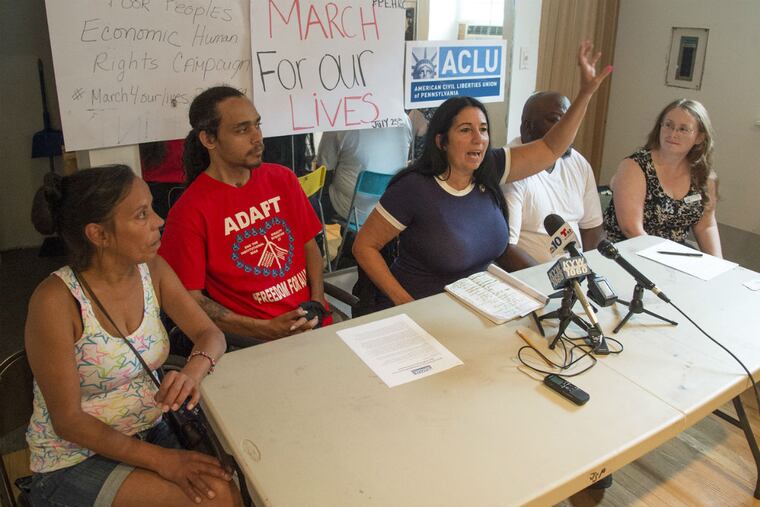ACLU sues Philly over DNC permit denial
The American Civil Liberties Union sued the City of Philadelphia in federal court Thursday over denial of a permit for a protest march down Broad Street on the opening day of the Democratic National Convention.

The American Civil Liberties Union sued the City of Philadelphia in federal court Thursday over denial of a permit for a protest march down Broad Street on the opening day of the Democratic National Convention.
The suit comes five weeks after longtime activist Cheri Honkala, who heads a group known as the Poor People's Economic Human Rights Campaign, sought a permit to march from City Hall to the Wells Fargo Center beginning at 3 p.m. July 25.
Honkala, who aims to highlight the plight of the homeless, said she thinks officials want to create a "festival" atmosphere here during the July 25-28 convention.
"Those that are homeless in Philadelphia don't feel like going to a festival during the convention," she said.
The city rejected the permit, saying it would substantially interfere with traffic in the area and conflicted with an already posted schedule of events.
The city has said it will not permit marches in Center City between 7 and 9 a.m. and 3 to 6 p.m. because of rush hour.
The ACLU argues that banning marches during those hours violates the First Amendment. The group is asking a judge to order officials to allow the march.
"Rush hour is basically half of the afternoon of every workday," said Mary Catherine Roper, deputy legal director of the ACLU of Pennsylvania.
The city has designated FDR Park at Broad and Pattison Avenue in South Philadelphia as a major gathering place for protesters that week, but Roper said their visibility there is limited.
"Let's be frank - most people are not going to be hanging out around FDR Park to watch the protests," Roper said. "During the day, Philadelphians and all of the people coming here for the convention are going to be in Center City Philadelphia attending meetings, going to restaurants . . . participating in the life of Philadelphia. The Poor People's Economic Human Rights Campaign represents part of the life of Philadelphia that should be as visible."
Roper said the city would not need to shut down Broad for a long length of time, - only when marchers pass.
"Given the number of other things we interrupt traffic for in Philadelphia, I think the First Amendment ranks up there in terms of a good reason to make a little delay in traffic," the lawyer said.
Lauren Hitt, the Kenney administration's chief spokeswoman, said the city Law Department had just received the ACLU's complaint and declined to comment Thursday. Hitt previously confirmed that no permits were being issued for protests during rush hours in Center City.
"It would impede the travel of ambulances and other public safety vehicles, and we won't have a sufficient number of public safety personnel available to protect demonstrators and nonparticipants from traffic-related hazards," she said last week when asked about rush-hour protests.
The suit comes on the heels of a victory for the ACLU of Ohio in a similar suit in Cleveland. The group argued that restrictions on where and when protesters can demonstrate at the July 18 to 21 Republican convention there violate free-speech rights, and a judge on Thursday ordered officials to redraw lines around Cleveland's "event zone" where protests are limited, Cleveland.com reported.
U.S. District Judge James Gwin also said in his verbal ruling that the city needed to rethink rules on when protests could occur. Similar to those in Philadelphia, Cleveland officials had said they would only allow protests a few hours each day of the convention, and not in high-traffic areas at peak times downtown.
So far, 23 groups have applied for permits to protest in Philadelphia during the Democrats' convention.
Honkala, who had a permit request denied in 2000 for the Republican convention here and marched anyway, said she would be undeterred this year regardless of the lawsuit's outcome.
215-854-5506 @juliaterruso